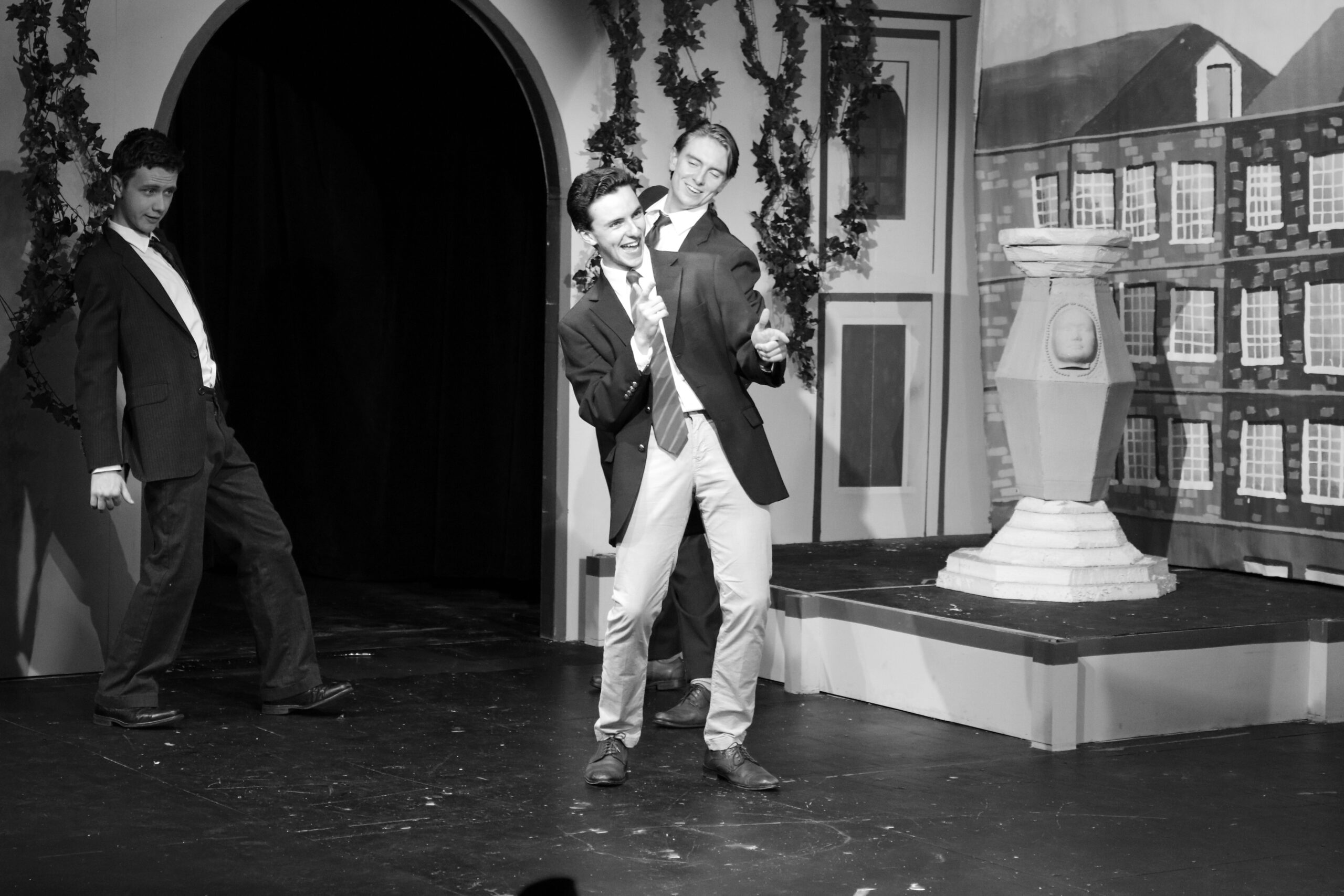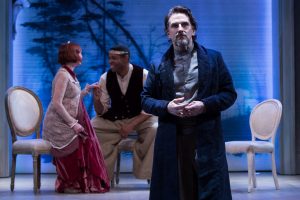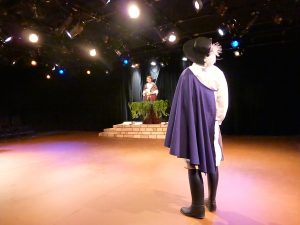The scene opens in Riggs library. Sam Kehoe (COL ’23), Scott Burke (COL ’26), and Sean Rafferty (COL ’26) are discussing their studies and strategizing about how to improve academically during their time at Georgetown.
But that discussion is entirely in iambic pentameter, and those three men are acting as King of Navarre, Berowne, and Longaville, respectively.
Set on Georgetown’s campus in 1969, Mask and Bauble’s take on Shakespeare’s Love’s Labour’s Lost is a commentary on the dynamics of love and gender. The show tackles the arrival of some of the College’s first female students (the SFS and School of Nursing had already been admitting women) in a way that feels important; it’s a history that hasn’t been told enough on our campus, and still feels relevant as our society continues to grapple with big questions of gender roles and sexuality. Livened with ’60s music, an engaging set, and an effervescent cast, the show does justice to its centuries-old source material while still being a joy to watch.
The show begins with Navarre and his crew pledging to remain chaste for three years in order to focus on their studies. But their commitment to this oath is complicated by the arrival of the Princess of France and her entourage, Rosaline and Katherine (played by Anna Kummelstedt (SFS ’25), Celeste Viana (SFS ’26), and Lucia McLaughlin (COL ’25), respectively).
As the cast mix up the recipients of love letters, dance around the room, jump on tables, mock and tease one another, and generally act like, well, silly college students, audiences are sure to feel energized in a way that few portrayals of Shakespearean works seem to achieve.
Among the most notable performances of the show was Burke as Berowne, a member of Navarre’s frat-boy-esque crew. A standout moment in the production is Berowne’s erratic, obsessive, and passion-fueled monologue when he realizes his love for Rosaline. Burke puts Berowne’s strong emotions on full display for the audience, revealing the inner thoughts of his character in a way that will resonate with anyone who has ever had a crush.
Kummelstedt’s performance as the Princess is also a highlight of the show. She’s poised, as she dominates the stage in each scene she’s in, rarely breaking her cool and successfully conspiring with her ladies to trick and mock the initially hostile men.
The gendered group-of-three dynamic works well in the show—audiences are sure to see the guarded and composed Princess, Rosaline, and Katherine as direct foils to the jocular and often unhinged Navarre, Berowne, and Longaville. Supporting characters, like Armado (Sasha Montefiore (COL ’25)) and Jaquenetta (Anastasia Kelly (COL ’26)) also engage audiences with their love stories.
And throughout, the show succeeds in adapting Shakespeare to fit the energy of juvenile, often immature college students who are still figuring things out, like the meaning of love and the direction in which their lives are going. They make grand proclamations, profess their love, and roll around on the floor. They gossip, tease, and tiptoe across the stage. Despite the old English and convoluted storyline, this energy may even sway the anti-Shakespeare crowd.
Threaded through the joyous tone of the play is its central theme of gender equality. “The women in the play are coming into a space that’s male dominated and that the men don’t want them in,” director Paul James (SFS ’23) explained.
The show’s questioning of gender roles in academic spaces—and the depiction of hostility towards women and other gender minorities—is one that still feels relevant at Georgetown, more than 50 years later. For any woman who has felt unwelcome in politics, business, and other professional fields, the show’s theme hits home.
“I feel like many people aren’t aware of Georgetown’s history with women and when they first were allowed to start studying here. So I think that’s gonna be really cool for people to see,” Briana Sparacino (COL ’25), the show’s producer, said.
Love’s Labour’s Lost succeeds in tackling gender roles not only in its portrayal Georgetown’s second-wave feminist fight for female admission, but also in its casting choices. Numerous traditionally male characters, like Costard (played by Maya Dow (COL ’26)) and Holofernes (played by Nell DiPasquantonio (COL ’23)) are cast as women.
Other choices made by the cast and crew also feel relatable for Georgetown students, like Kehoe’s character Navarre. “He’s sort of a jock. He’s a little bit of a daddy’s money, like super-senior-SFS type,” Kehoe said.
Self-aware mockery of Georgetown students aside, the cast portray Georgetown life in a way that feels genuine, despite the challenges of multiple historical contexts to balance. The show’s language remains true to Shakespeare’s script, despite the setting being completely different from the original 16th century context—making the acting process challenging but the 450-year-old characters feel more relatable to 21st century audiences. In the process, the show affirms the universality of Shakespeare’s classic.
The characters are dressed in sharp academia-style garb, which comes off as genuine mid-century student attire and reflects the deep research Mask and Bauble leadership—particularly dramaturg Amelia Shotwell (COL ’25)—did in preparation for the show. After selecting Love’s Labour’s Lost as Mask and Bauble’s fall production last spring, club leadership conducted deep archival research into the admission of women to Georgetown in the 1960s.
“The library had a lot of archival photographs. So we looked at those for everything from costume design to designing our set,” James said.
The beautifully designed set of Love’s Labour’s Lost is what really makes the blend of Shakespeare and Georgetown work. The two settings of the play—inside Riggs and Dahlgren Quad outside of New North—are instantly recognizable, and expertly crafted, switching between the full bookshelves and cast iron railings of Riggs library, and a massive hand painted tapestry designed by Dipasquantonio.
The set features a large removable window, a black metal bench like the ones all over campus, and books of all kinds everywhere (I’m looking at you, socialist theory on the table). It’s impressive and positioned well for a somewhat unusual stage like Poulton Hall, where the audience is directly in front of the stage and on stage right.
The show’s soundtrack and choreography is a testament to the cast and crew’s ingenuity. Mask and Bauble’s Love’s Labour’s Lost is packed with ’60s bops (including “Happy Together” by The Turtles) and lively dance sequences that aid in setting the lively tone of the show and off-setting the sometimes monotonous language. These songs are mostly played during set changes and intermission, although there is one grand finale dance sequence at the end that is sure to get audiences itching to dance too.
Of course, it’s challenging to perform Shakespeare. While the cast performs their roles well overall, there are scenes that attempt to enliven the occasionally inaccessible story that fall flat or come off confusing. One is when the Page (played by Caitlin Waugh (COL ’24)) sings “Close to You” by The Carpenters in the middle of the show—a choice that may confuse audiences. It’s not entirely clear why the song is performed, but Waugh performs the song well, and it does keep the audience on their toes.
There are also moments throughout in which the Shakespearean language remains confusing, despite actors’ best efforts to portray meaning through body language. And the subplots and supporting characters can confuse audiences, too (wait, what’s that character’s name again?). That is, however, the nature of Shakespeare—and one that even with best efforts, is an enormous challenge to overcome.
“It’s one thing to read Shakespeare, then it’s another thing to act it. And the audience listening to it needs to understand it,” Kummelstedt said, reflecting on the challenges the cast faced in this adaptation.
Despite a few shortcomings, Love’s Labour’s Lost remains a highly engaging show, one that Georgetown audiences should make a point to see. It tells a story that’s relatable to any student who’s been in love—or, perhaps unsuccessfully, sworn off romance entirely in hopes of better grades.
Love’s Labour’s Lost will run from Thursday, Oct. 27 until Saturday, Nov. 5 in Poulton Hall. Tickets available here.
Love’s Labour’s Lost director Paul James is the Voice’s Editor for Sexual Violence Advocacy, Prevention, and Coverage, and is on the editorial board. Assistant director Drew Lent is a member of the Voice as the assistant website editor.





